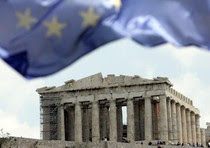domenica 20 maggio 2012
Il Wall Street Journal la vede nera sulla Grecia.
Europe Weighs Exit Scenario
By BRIAN BLACKSTONE, MATINA STEVIS and STEPHEN FIDLER
FRANKFURT—Europe has begun to prepare for Greece's possible exit from the euro zone ahead of a crucial round of elections in the country next month, which are fast becoming a referendum on its membership in the common currency.
Euro-zone officials have started emergency planning to contain the fallout from a Greek exit from the currency bloc, officials said Friday. That includes the preparation of emergency scenarios by staff at the European Commission, the European Central Bank and in national finance ministries, the officials said.
The euro zone's financial "firewall" may need to be boosted to reassure markets that neither Spain nor Italy would be allowed to default on their debt during any market panic that might follow an eventual Greek exit, they said. The bloc's bailout fund has unused lending capacity of €500 billion ($635 billion), only enough to finance Spain and Italy, widely seen as the next two dominoes that could fall in the euro-zone crisis, for a few months.
European Union Trade Commissioner Karel De Gucht caused a stir Friday when he told a Belgian newspaper that the commission and ECB were "working on emergency scenarios if Greece does not make it."
It was the first admission by a senior commission official that the EU has contingency plans in place. Germany's finance ministry further stoked speculation of such preparations. Asked whether the ministry was drafting emergency measures, a spokeswoman cited comments by Finance Minister Wolfgang Schäuble, saying: "Our citizens expect us to be prepared for every eventuality."
Emergency planning for a Greek euro-zone exit was discussed at the weekly meeting of the 27 European commissioners, said a senior EU official. The flight of deposits from the Greek banking system threatens to accelerate the timetable on which the country could be thrust from the euro zone, said one official involved in the talks. "If it reaches large dimensions then it's not solvable," the official said. "At the current moment, it's manageable."
European leaders and ECB officials have in recent days publicly raised the possibility of Greece's exit from the euro if elections next month result in a government that rejects the terms of Athens's latest bailout.
Yet denying any "Plan B" in case Greece defaults could erode confidence in financial markets, if investors doubt the ability of European officials to deal with any fallout of a worst-case scenario.
In a sign of how sensitive the topic is, European Commission officials scrambled Friday to clarify that the EU is neither expecting a Greek exit from the 17-nation euro zone nor working to push the country out of the common currency area.
"I'd like to reaffirm very clearly that we want Greece to stay in the euro area," European Commission president José Manuel Barroso told reporters before the Group of Eight summit that he is attending in Camp David, Maryland.
"We will do whatever it takes to guarantee the financial stability of the euro zone," added Herman Van Rompuy, who as president of the European Council chairs EU summits.
Both leaders declined to say whether their institutions were studying contingency plans for a possible Greek exit. "We never comment on Plan 'B'," Mr. Barroso said. "We are working on Plan A," which is for Greece to remain in the euro zone, he said, adding that he believed the magnitude of Europe's efforts so far had been underestimated.
Friday also brought confirmations of a report that De La Rue PLC—a U.K.-based company that is one of a handful that prints bank notes of different currencies—is making Imagepreparations to print an alternative Greek currency in the event that the country quits the euro zone.
A person familiar with the industry confirmed a report in the Times of London that the company is discreetly preparing for a revival of the drachma. The initiative is the company's own, this person stressed, and isn't spurred by any Greek request. The Bank of Greece, which has repeatedly declined to respond to questions as to whether it is preparing a contingency on bank notes, declined to comment Friday.
Any initiative to create new Greek bank notes with modern security measures could take months of preparation, testing and vetting. It's unclear how long De La Rue has been working on the plan and if others are doing so.
Markets were spooked Friday by reports that German Chancellor Angela Merkel told Greek President Karolos Papoulias that Greece should include a referendum on its euro membership with next month's elections. Greece's main political parties denounced what they saw as foreign interference in their affairs. Berlin denied Ms. Merkel made such a proposal.
The ECB said it doesn't "engage in any speculations about any emergency plans or possible scenarios and therefore do not comment [on] Commissioner De Gucht's statement." The "immutable preference" is for Greece to stay in the currency bloc, the ECB said, referring to comments Wednesday from ECB President Mario Draghi.
Mr. Draghi has also said Greece's future in the euro zone isn't a matter for the ECB to decide. Still, the ECB has a lot at stake. It owns around €45 billion in Greek government bonds it started purchasing when the crisis first flared two years ago. It has about €80 billion in outstanding loans to Greek banks and billions more through emergency lending.
Though messy, the ECB could probably withstand the immediate hit to its balance sheet if Greece repudiates its debts and exits the euro. The central bank has vast gold and foreign-exchange reserves. It earns billions of euros in fees from printing euro notes. Any losses on bondholdings and from central bank claims on Greece—known as Target2—would be spread throughout the 17 national central banks that comprise the euro, meaning Germany would take the largest hit.
The bigger issue for the ECB would be how to deal with any contagion to other vulnerable euro-area countries such as Spain. The ECB could make more unlimited loans available to banks to ease fears of a credit crunch. It could also restart its dormant bond-purchase program to provide immediate relief to Spanish and Italian government-bond markets.
—Matthew Dalton, Jessica Hodgson and William Boston contributed to this article.
Iscriviti a:
Commenti sul post (Atom)




Nessun commento:
Posta un commento